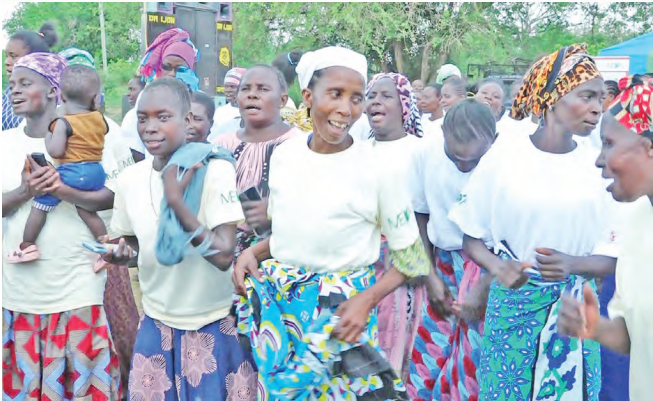
Over 16,000 cases of GBV and femicide recorded in Uasin Gishu
Athletes Agnes Tirop, Rebecca Cheptegei and Damaris Muthee among women killed.
Initiative to equip women with sustainable livelihoods through chicken rearing
In Summary

Women from Sauti ya Wanawake Magarini during a 16 Days of Activism against GBV event at Garashi Primary School in Magarini, Kilifi county /CHARLES MGHENYI
The programme seeks to economically empower women.
Spearheaded by Sauti ya Wanawake Pwani, the initiative seeks to equip women with sustainable livelihoods through chicken-rearing projects while simultaneously running awareness campaigns to reduce their vulnerability to GBV.
So far, the programme, funded by MEDA, has directly impacted over 700 women in Kilifi county. Beyond Kilifi, an additional 200 women in Taita Taveta county and 50 in Mombasa county have also benefited.
This initiative aims to foster both economic independence and social resilience among women in the region, enabling them to confront the challenges posed by poverty and inequality.
Sauti ya Wanawake Pwani programme coordinator Lucky Mwaka emphasized the critical link between poverty and GBV.
She said economic vulnerability often traps women in abusive situations.
“Gender-based violence is rampant because the majority of women in these areas are impoverished and unable to break free from dependency,” she said.
“By providing them with the tools for financial independence, we are giving them a chance to reclaim their dignity and safety.”
She was speaking during the celebration of the 16 Days of Activism Against GBV at Garashi Primary School in Magarini, Kilifi county.
Mwaka further revealed that eight women’s groups have been provided with 100 chicks each. Once fully grown, their sale is expected to generate Sh100,000 per group.
This income will not only uplift the women economically but also strengthen their ability to resist exploitation and abuse.
“Our vision is that through these small but impactful steps, we can drastically reduce GBV cases in the region by empowering women to stand on their own feet,” Mwaka added.
Bibi Anna Salim, a representative from Sauti ya Wanawake Magarini, expressed gratitude to MEDA for the initiative.
She noted that the initiative’s impact extends beyond individual economic benefits to transforming communities by reducing poverty, which is a significant driver of GBV.
“This initiative has given us hope and the means to fight back against poverty and GBV. We urge other organisations to follow MEDA’s lead by supporting similar projects that empower women and foster awareness,” she said.
Josephine Charo, the chairlady of Sauti ya Wanawake Garashi, called for stronger government intervention in addressing GBV and gender inequality.
She stressed that empowerment programmes like this one are key in ensuring women become selfreliant and financially stable, thereby reducing their susceptibility to abuse.
“We need the government to treat cases of GBV with the seriousness they deserve. Economic empowerment is the foundation for preventing these incidents,” she said.
In Bingale, the impact of the empowerment programme has been significant. According to Charo, community awa re n e s s a n d e c o n o m i c empowerment have led to decisive action against GBV perpetrators.
She recounted a recent incident where a man who attacked a nineyear-old child was confronted by the community, illustrating how awareness and economic stability can unite communities against such vices.
“Poverty is at the heart of GBV
and inequality. When women are
economically empowered, they
can rise above this and protect
themselves and their families,”
Charo said.

Athletes Agnes Tirop, Rebecca Cheptegei and Damaris Muthee among women killed.